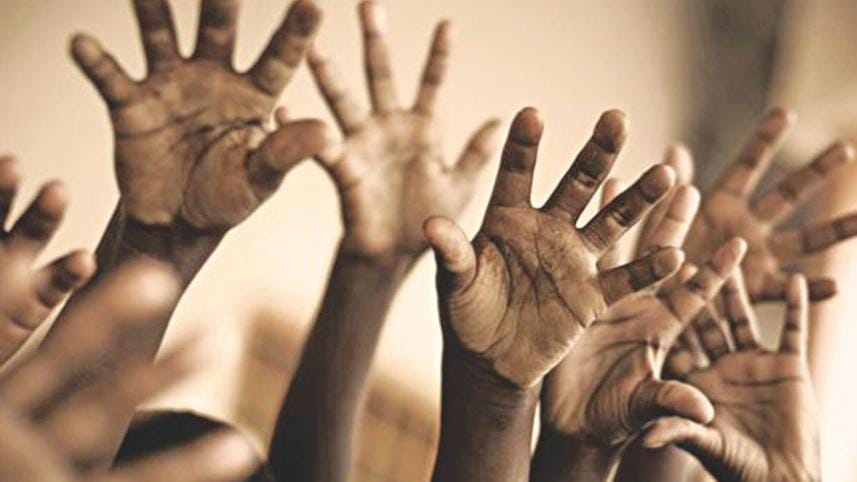Amplifying children justice system

Children being in one of the most vulnerable groups of the society, need special care in handling especially in case of delinquency. Although children justice systems exist in countries throughout the world but they usually vary with the degree of harassment associated with the handling of children and the corrective measures adopted thereupon. The level of variation and gravity of harassment necessitated the promulgation of various international instruments which are used as the measuring tools of the children justice system, one of which is the Convention on the Rights of the Child (CRC) 1989, which has a binding effect upon the ratifying member States of the United Nations for adoption. It is the responsibility of every citizen to ensure that children's rights are affirmed and to improve the life of children; and to protect their rights. Therefore, the responsibility implies that state and civil society organisations ensure the full flowering of childhood and protection of children.
Though the international conventions have set certain responsibilities for the ratifying States, there is no formal obligation to implement the provisions of the conventions. It is an accepted principle that international covenants, conventions treaties and other instruments signed by the State parties are not considered to be binding unless they are incorporated into the laws of the land. The general practice of the country is evident that international treaties do not automatically become part of the domestic laws unless and until they are incorporated into the domestic legislation.
The issue of state responsibility is very much important to create a child-friendly justice in the country. In practice, courts in Bangladesh cannot enforce international treaties even if ratified by the State. They must be incorporated in the municipal legislation.
However, the status of treaty under the constitution within the domestic law still remains unclear in many cases. But where there is a gap in the municipal law in addressing any issue, the courts may take recourse to the international conventions and protocols on that issue for the purpose of formulating directives and guidelines to be followed by all concerned until the national legislation enacts laws in this regard. Thus, any international convention or treaty can be invoked by the court upon its incorporation by the parliament. Although courts cannot enforce treaties or conventions even after they have been ratified, they (courts) can use them for explaining the grounds of the judgments.
The High Court Division issued some landmark judgments which established the fact that no children should be tried by the criminal justice system or by any special tribunal established under any special law. The courts have considered the development of the children laws, international treaties, covenants and conventions in the cases of State v Md Roushan Mondal (59 DLR 2007 72) the State v Metropolitan Police Commissioner, Khulna (60 DLR 2008 660) etc. and have explained how and why should Bangladesh express its subordination towards the international treaties and conventions. In this regard it was held as follows: “Bangladesh was one of the first signatories to the Convention and is bound to take steps for implementing the provisions thereof. Being a signatory we cannot ignore, rather we should, so far as possible, implement the aims and goals of the UNCRC.”
After seven years of the case of State vs. Md Roushan Mondal Bangladesh has reflected the CRC in the new Children Act 2013 including juvenile courts and juvenile justice board for child welfare by the Children Act 2013.
The CRC upon its ratification has become binding on Bangladesh. The Convention in Article 4 sets out the general measures of implementation that the States are required to undertake to implement all the rights stated in the CRC, including in the area of legislative reform. Thus, Article 4 of the Convention provides that “State Parties shall undertake all appropriate legislative, administrative, and other measures for the implementation of the rights recognized in the present Convention.” State parties to the CRC must have a legal framework that is both effective and compatible with the CRC and that ensures that the rights the Convention vests in children are fully enforceable under the national laws.
To make the CRC effective, it has been a part of the domestic law as well in 2013. From legal point of view, only the CRC amongst the major international instruments, is legally binding, while the other three instruments (Beijing Rules, Riyadh Guidelines and JDL Rules) exist to be the non-binding 'soft laws'. These three non-binding instruments complement and provide guidance for the implementation of the CRC and accordingly referred to as 'United Nations standards and norms in juvenile justice'.
The law enforcement mechanism is very weak in developing countries like Bangladesh. It is needed to develop accountability to all levels and to build up international network for the promotion of responsibility towards fair children justice. At the same time, it is needed to make dramatic progress on internalisation of law with a special focus on responsibility in order to take effective binding measures.
It is also important to train up the persons concerned in the children justice system so that proper implementation of the new law can be ensured. Therefore, a holistic approach must be taken by all concerned to ensure that the children of this country achieve fulfillment of their rights. In this context, Bangladesh should develop a mechanism for the implementation of the international standards to achieve justice and dignity for our children.
The Writer is Associate Professor of Law, Bangladesh Open University.



 For all latest news, follow The Daily Star's Google News channel.
For all latest news, follow The Daily Star's Google News channel.
Comments